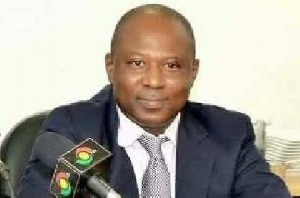 Dr Abdul Nashiru Issahaku, BoG governor
Dr Abdul Nashiru Issahaku, BoG governor
The business community, backed by some economists have intensified renewed calls for the central back to strongly consider cutting its policy rate to induce growth following the decline in inflation and stability in the cedi.
The entreaty comes as the Monetary Policy Committee of the Bank of Ghana prepares to meet for the last time this year on Friday to assess developments in the economy and set the policy rate, a key determinant in the direction of interest rate and cost of borrowing.
According to businesses, led by the Ghana Chamber of Commerce and Industry, all economic indications point to reduction in the policy rate, which has remained at 26 percent for over a year now.
The President of the Ghana Chamber of Commerce and Industry (GCCI), Dr. Nana Appiagyei Dankawoso I, argued that the need for a reduction in the policy rate was informed by the high interest rate regime in the country, which he said, has fuelled the high unemployment and underemployment rate in the country.
“Businesses cannot thrive well when there is high interest rate. The private sector is the engine of growth and anytime the policy rate goes up, it makes it difficult for them to access loans from the banks and this has led to some of them laying off workers. So definitely, we as a chamber, will call for a reduction in policy rate for businesses to thrive,” he said.
The central bank has consistently maintained that its inflation target will remain anchored on monetary and fiscal policy tightness.
However, Dr. Eric Osei-Assibey, an Economist at the University of Ghana, reasoned that the current economic conditions support the need for the MPC to cut the policy rate to boost access to credit, which has been tightened after a jump in the Non-Performing Loans in recent times.
“I think now they have little excuse to review the rate upwards because if you look at the quantum of fall in inflation, it was quite significant—from 17.2 in September to 15.8percent in October. Unless the central bank can still convince us that they still believe that inflation pressures are high in the coming months.
“To some extent they can argue that exchange rate is rising and so they want to bring some stability in exchange rate and they still want to tighten up a bit. But I think what is happening in the exchange rate is much more seasonal than any other factor. For me, it is high time the central bank reduced the monetary policy rate,” Dr. Osei-Assibey said.
The Governor, Dr. Abdul Nashiru Issahaku, hinted after the last MPC meeting in September that upside risks to its inflation outlook still exist, and could come in the form of unanticipated shocks, especially with regards to the intermittent upward adjustments in petroleum and utility prices, and their pass-through effect.
But Dr.Osei-Assibey posits that the political season does not make it likely for the prices of utilities and fuel to see an upward change.
“If this is the case we are not expecting any big jump in the utility bills and petroleum prices in the coming weeks; and the rains too have been very good, so, I don’t see any other factor which will work against inflation coming down,” he maintained.
He further stated that, in as much as it is the responsibility of the central bank to control inflation, the growth of the economy should be on top of the scale of preference of the bank, hence reduction in the policy rate is key.
“It is important that we don’t always fix our minds so much on inflation. We must all the time look at growth enhancing policies. The interest rate in this country is too high and businesses are railing under very difficult conditions.
“So, we should find a way of reducing interest rate so that the real sector can have access to credit and expand the economy. It is not just achieving inflation targets but also achieving sustained economic growth that will create employment for the people,” Dr.Osei-Assibey said.